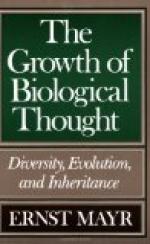5. Philosophy fails (once more), because it has no adequate malady for the moral malady under which our race labors. When we speak of men weighing fairly the present and the future, comparing impartially the substantial with the showy, the gross with the refined, and choosing after the decision of a fully informed prudence, we suppose what does not exist; “The good that I would, I do not; but the evil that I would not, that I do.”
“The better
seeing and approving,
Towards
the worse I still am moving:”
Such is the united testimony of Christian and heathen to that “law of sin and death,” through whose tyranny the united decisions of reason, prudence and conscience are powerless, till what the law could not do, “in that it was weak through the flesh,” the grace of the Gospel accomplishes; restoring reason and conscience to the throne, giving effect to the conviction, how fully coincident are interest and duty— “that the righteousness of the law might be fulfilled by us, who walk not after the flesh, but after the spirit.”
Paul’s account of this matter may have accommodated to it, what John says of the command to mutual Christian love; that it is an old history, and yet not an old but a new one. Old, in the sense, that, from what time by one man sin came into the world and death by sin, every one in earnest to fulfil the true end of his being, has found the dame impotence attached to good resolves; the same supremacy gained by the baser impulses, in the hour of trial; the same temptation to find an excuse in what seems so like a law unavoidable, as if it were no more I that do it, but sin that dwelleth in me, as if it were not the responsible I that did wrong: this I being controlled by sin, which is fancied as a foreign agent taking up a residence within, and controlling the man in spite of him. And, escaped from this and the like deceits, all have been brought to the stand, “O wretched man that I am, who shall deliver me from the body of this death!”—that species of self-despair, finishing the preparation for that renewing influence, which “is not of him that willeth, nor of him that runneth, but of God that showeth mercy.” Thus the enemy is raised in die Luften frei, no more to receive fresh strength from mother Earth, to renew the contest successfully.
But this account, so old in one sense, is not so in another—in the sense of being obsolete, or out of date. It still retains the freshness of novelty, to answer to the last example of a man’s ordering life, as, he knows, meets the approval of his Judge, and his own truest welfare.




